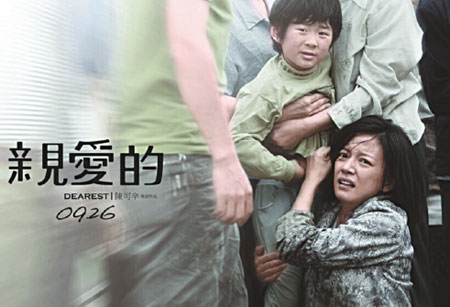Touching heartstrings
Updated: 2014-10-16 06:50
By Liu Wei(China Daily USA)
|
||||||||
Dearest, based on China's missing children, is a box-office hit despite its grim subject, Liu Wei reports.
Hong Kong director Peter Chan's film, Dearest, based on the kidnapping and selling of children in China, has emerged as the most popular film second only to a comedy during the weeklong National Day celebrations.
The October holidays, also known as the Golden Week, is a competitive time at the box office.
Inspired by the real-life stories of two families involved in the search for their missing children, the film is the country's first feature-length production on the grim subject.
According to the Ministry of Public Security, about 54,000 children were rescued between 2009 and 2013 from criminal rings; some were trafficked for forced labor while others were sold to childless couples.
One of the two families on whose accounts the film is based has yet to find their child, who went missing seven years ago at age 4. The other child, also 4 when he was kidnapped in 2008, was found by police in 2011.
In the past few years, parents of several missing children have formed associations to help each other, which the film also depicts.
"Maybe one film cannot change the world, but it can make things a bit better," Chan said at this year's Venice Film Festival in September, when the film was screened.
The film has grossed 300 million yuan ($46 million) since its premiere in China on Sept 25. Competing with Ning Hao's Breakup Buddies, a film about two men's journey across China in pursuit of sexual encounters, Chan's film won both popular and critical accolades. It even outshone The Golden Era, a film with some 30 veteran actors including youth icon Tang Wei.
Wang Changtian, CEO of Enlight Media, one of the companies that produced the film, was delighted by the audience response and the film's social impact.
"The sincerity and quality of this film has broken the boundaries between commercial and art-house cinema," he wrote on Chinese micro blog Sina Weibo. "It has social relevance, which is more important than the box office."
On the day after the film's premiere, the Ministry of Public Security said that reports of missing children and teenage girls would be immediately registered, instead of the required 24-hour waiting period.
In Dearest, a father goes to the police after finding his child missing, but is told he could only report the matter 24 hours later.
Huang Bo, the film's lead actor, also made public the cellphone number for Sun Haiyang, the father who lost his son seven years ago, and whose account inspired parts of the film.
"What makes this film meaningful is the awareness of the social problem, and that there's need for greater security of children," wrote lead actress Zhao Wei on her micro blog.
Huang, himself the father of a 3-year-old girl, announced Sun's contact details on Happy Quarter, one of the most popular TV shows in China.
Viral marketing played an important role in the film's success as well, according to Yang Dameng, who runs his own film marketing agency.
"The box office of Dearest kept rising after its premiere, which is unusual. It only happens when a film has an excellent reputation and gets enough public attention," Yang says.
He described Breakup Buddies as the "most traditional holiday film", with a lot of easy jokes, bold sex scenes, beautiful girls and misadventures - a formula that is bound to sell.
"But Dearest is about such an important topic. I am so glad to see it win over audiences."
Contact the writer at liuw@chinadaily.com.cn
|
Zhao Wei (above and below left) portrays the rustic rural wife of a child smuggler and Huang Bo (below right) plays a devastated father whose son was abducted. Photos Provided to China Daily |
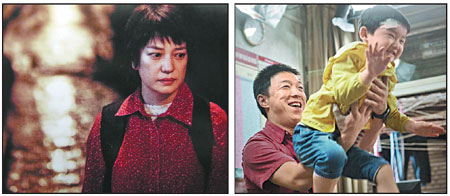
|
Directed by Peter Chan, Dearest, based on the kidnapping and selling of children in China, features several Chinese stars including Zhao Wei, Huang Bo, Tong Dawei, Hao Lei, Zhang Yi and Zhang Yuqi. |
(China Daily USA 10/16/2014 page9)
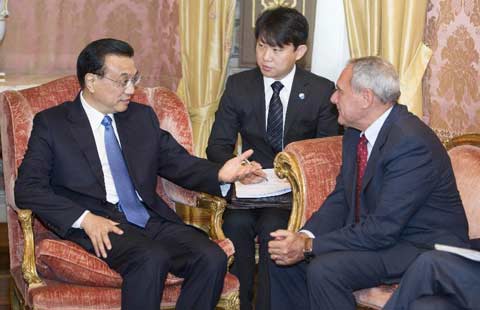
 Li pledges stronger parliamentary exchanges with Italy
Li pledges stronger parliamentary exchanges with Italy
 Forbidden City art goes on display
Forbidden City art goes on display
 Photo Beijing 2014 kicked off
Photo Beijing 2014 kicked off
 Bilateral difficulties on manageable track
Bilateral difficulties on manageable track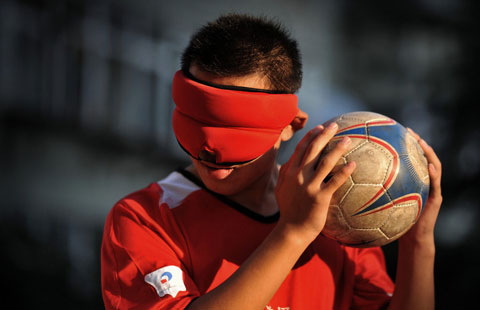
 All eyes on White Cane Safety Day
All eyes on White Cane Safety Day
 Taiwan photographer depicts NYC on grand scale
Taiwan photographer depicts NYC on grand scale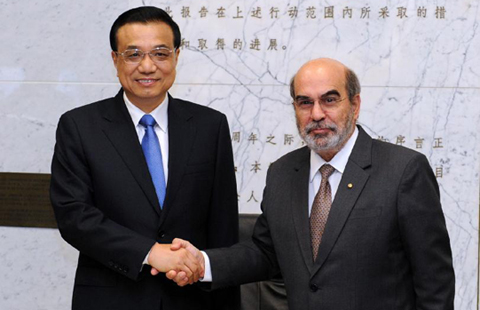
 Premier Li meets director-general of UN FAO in Rome
Premier Li meets director-general of UN FAO in Rome
 White House also produces harvest joy
White House also produces harvest joy
Most Viewed
Editor's Picks

|

|

|

|

|

|
Today's Top News
Premier Li sows the seeds for farming
US CEOs wish trade treaty a priority
China singled out for 'important' role in Africa's development
Obama holds Ebola meeting
Exporters lower sights for sales at Canton Fair as woes persist
'Main course' still ahead, Li says
HK leader says protests hatched for more than year
Li pledges parliamentary exchanges with Italy
US Weekly

|

|
